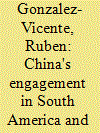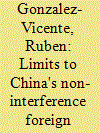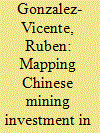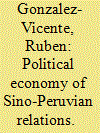|
|
|
Sort Order |
|
|
|
Items / Page
|
|
|
|
|
|
|
| Srl | Item |
| 1 |
ID:
102681


|
|
|
|
|
| Publication |
2011.
|
| Summary/Abstract |
China's engagement in South America and Africa's extractive sectors has increased significantly in the last decade. How comparable are the African and South American cases from a developmental perspective? This article explores resource curse theories, arguing that the 'curses' often associated to extraction are historically produced dynamic processes that need to be reevaluated in light of China's direct and indirect impacts on resource-endowed countries. It elaborates a framework to compare the developmental dynamics entailed by China's involvement in the South American and African extractive sectors, distinguishing between external, internal and intrinsic 'curses'. The article holds that China's growth and investment have strengthened the position of resource-endowed countries in the international economy, revitalizing resource industries and improving terms of trade for commodities. Concurrently, the expansion of extractive activities has brought about increased environmental and economic sustainability challenges. Divergences between the African and South American cases are best observed at the national levels, where China's non-interventionist approach has different developmental implications depending on internal trends within investment host countries.
|
|
|
|
|
|
|
|
|
|
|
|
|
|
|
|
| 2 |
ID:
136955


|
|
|
|
|
| Summary/Abstract |
China's foreign policy has been long committed to a principle of non-interference in the internal affairs of sovereign countries. While one could easily point out past and present-day inconsistencies in its implementation, this article argues that defenders and critics of the principle both rely on a limited interpretation of ‘interference’ or ‘intervention’ based on an ideology of Westphalian sovereignty. Particularly problematic is the conceptual distinction between the ‘political’ or ‘diplomatic’, on the one hand, and the ‘economic’, on the other. As Polanyi's concept of embeddedness reminds us, markets, society and politics occur simultaneously, and can only act as discrete realms in epistemological abstractions. It is thus argued that non-interference is a semi-formal institution that governs China's diplomatic engagements and affects its economic activities. While the totality of China's interactions with the world has diverse and sometimes contradictory impacts on global governance, non-interference itself has apparent consequences for the rescaling of regional economic governance. Specifically, this article contends that Chinese non-interference results in the empowerment of political elites at national levels, and thus in the (re-)emergence of the nation state as a gatekeeper and facilitator of the advancement of capitalist enterprises. As a result, through non-intervention, China's foreign policy undermines supranational regulatory approaches and fosters state-based regional architectures.
|
|
|
|
|
|
|
|
|
|
|
|
|
|
|
|
| 3 |
ID:
112501


|
|
|
|
|
| Publication |
2012.
|
| Summary/Abstract |
Analyses of Chinese foreign direct investment (FDI) sometimes question the investment criteria of Chinese firms, suggesting that market rules are not fundamental but secondary to political and geostrategic concerns. Questioning the apolitical nature of markets, the present article uses the internationalization of China's mining industry as a case study to ascertain the criteria that guide Chinese FDI. It first examines quantitative data from 2000 to 2010 which suggests that Chinese mining investment in Latin America and worldwide gravitates towards liberal economies. Second, by focusing on the projects of Chinese mining firms in Peru, the article illustrates how China's overseas mineral quest is best explained by probing into the integrated strategies of individual mining firms which seek to capitalize their comparative advantage in accessing Chinese markets and the political momentum of the "Going Out" strategy.
|
|
|
|
|
|
|
|
|
|
|
|
|
|
|
|
| 4 |
ID:
112544


|
|
|
|
|
| Publication |
2012.
|
| Summary/Abstract |
This article reviews dependency postulates and examines whether they are applicable to explain the political economy of China's contemporary relations with Peru. It argues that the dichotomy between Peru as a commodity-providing periphery and China as a core manufacturing centre is insufficient to explain the ways in which power is embedded in the international economic system, and particularly inadequate to identify winners and losers in the international division of labour. Thereby, in line with some recent international political economy discussions of power, the article proposes that China should not be understood as a self-contained economic entity, but as a hub where natural resources are mobilized for transnational production. Furthermore, contending that a focus on nation-states fails to capture the complexity of (under)-development dynamics, it suggests that notions of internal colonialism, flexible sovereignties and postcolonial analyses of representation provide fresher perspectives from which to understand the distribution of power along the political economy of Sino-Peruvian relations.
|
|
|
|
|
|
|
|
|
|
|
|
|
|
|
|
|
|
|
|
|